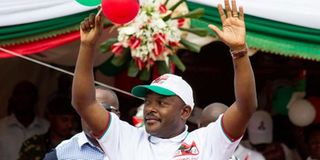Burundi elections to be held on Monday despite ongoing protests

Burundian President Pierre Nkurunziza acknowledges the crowd as he arrives to give a speech during the official start of the 2015 electoral campaign by the The National Council for the Defense of Democracy–Forces for the Defense of Democracy party (CNDD–FDD) in Bujumbura, on June 26, 2015. PHOTO | LANDRY NSHIMIYE |
What you need to know:
- There are fears that the tiny East African country could plunge into civil war, again.
- Peace deal was signed in 2006 but all power is in the hands of very few.
BUJUMBURA
Burundi goes to the polls Monday in local and parliamentary elections, despite international calls for a poll delay after weeks of violence over President Pierre Nkurunziza’s bid to cling to power.
“We are determined. There will be no turning back,” said a top official of the ruling CNDD-FDD party, which boycotted UN-led crisis talks this week, calling them a diversion “aimed at disrupting the elections.”
But the party is also split, with one of the country’s vice-presidents and a key CNDD-FDD member fleeing to Belgium and adding his voice to calls for Mr Nkurunziza to abandon his third-term bid.
SPLITTING COUNTRY
Burundi was plunged into turmoil in April when Mr Nkurunziza launched his drive to serve a third consecutive five-year term in the upcoming presidential elections.
His opponents say this is unconstitutional and a violation of a peace deal that ended 13 years of civil war in 2006.
Around 70 people have been killed in weeks of opposition protests that have been brutally suppressed, triggering an exodus of around 100,000 to neighbouring countries.
Some of the worst violence took place last month after a failed coup.
In a letter to Mr Nkurunziza, second vice-president Gervais Rufyikiri urged him to “put the interests of the Burundian people before your personal interests”.
“Withdraw your presidential bid, because it violates the constitution,” Mr Rufyikiri wrote after fleeing the country.
But analysts say the ruling party appeared intent on pressing ahead with the elections, despite the country being mired in its worst crisis since the end of the war.
Many fear a repeat of that violence, which split the country along ethnic lines, pitting the majority Hutus against the minority Tutsis.
European Union foreign ministers have threatened sanctions against individuals involved in the violence, while the African Union and the regional five-member East African Community bloc have said conditions for the holding of elections do not exist. The US has issued similar warnings.
“The problem is that the Burundian leaders do not respond to traditional patterns of diplomacy and are deaf to calls and threats of sanctions,” one diplomat said. He added that the diplomatic community was unsure of how to act in the face of such intransigence.
ARUSHA AGREEMENT
Mr Nkurunziza’s CNDD-FDD is an ex-rebel Hutu group, that fought in the bitter 1993-2006 civil war in which at least 300,000 people were killed.
Power still remains concentrated in the hands of a tiny elite around Mr Nkurunziza, particularly a core of powerful generals.
A former CNDD-FDD rebel says although the group became a political party after the peace accord, little had changed.
“Military leaders still run everything,” said the one-time ruling party loyalist.
Mr Thierry Vircoulon of the International Crisis Group, a conflict prevention think-tank, said Burundi’s fate was in the hands of less than 10 people, who “have the same goal and vision: to stay in power”.
Under the constitution, based on the Arusha peace deal that paved the way for the end of the civil war, there are strict Hutu-Tutsi ethnic quotas in parliament.
“However, leaders of the Hutu-dominated ruling party are also reportedly considering changes to that arrangement of sharing power with Tutsis, putting aside the political consensus embodied in the agreement of Arusha,” Mr Vircoulon said.
After a brief lull in the violence, following a crackdown by security forces on more than a month of street protests, the situation has escalated again in recent days.
GRENADE ATTACKS
At least four people have been killed and 40 wounded in a string of grenade attacks targeting both civilians and police in the past few days.
The president’s critics fear worse could lie ahead.
But ruling party leaders appear desperate to retain power, despite the risks.
According to one CNDD-FDD dissident, who also asked not to be named, Mr Nkurunziza was being backed “even if this plunges the country back into chaos.”





